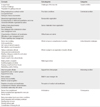Abstract
Purpose
The purpose of this study was to explain the role transition process to nurse case managers (NCMs) for Medical-aid beneficiaries in Korea.
Methods
Fourteen NCMs were interviewed regarding their experiences of becoming proficient in the new role of case manger. Data were analyzed through the application of grounded theory.
Results
'Taking root in a barren land' was the core category explaining the role transition process of NCMs. They engaged in four stages: launching, trial and error, proficiency, and wait-and-see stages. NCMs showed not only fear but also passion for case management practice. Despite their passion and effort, NCMs went through a period of trial and error. After becoming skilled, NCMs went through a stage of wait-and-see often because of job insecurity related to temporary position or few opportunities for promotion. Factors influencing NCMs' role transition process included their understanding of client characteristics, belief in case management, and support from their colleagues and families.
Figures and Tables
References
1. Allen V.L., van de Vliert E. Allen V.L., van de Vliert E, editors. A role theoretical perspective on transitional processes. Role transitions: Explorations and explanations. 1984. New York, NY: Plenum Press;3–18.
2. History of medicaid case management. Center for Medicaid in Korea. 2011. February 28, 2011. from http://www.macmc.or.kr/medical_biz/history.php?swf_pn=3&swf_sn=2.
3. Corbin J., Strauss A. Basics of qualitative research. 2008. 3rd ed. Los Angels, CA: Sage.
4. Cho B.S. A study on the effect of perceived job insecurity on job satisfaction and turnover intention. 2008. Daegu: Kyungpook National University;Unpublished master's thesis.
5. Choi J.M., Oh J.J., Lee H.J. A study of job stress and job satisfaction of Medical Aid client managers. Korean Journal of Occupational Health Nursing. 2008. 17:146–154.
6. Cusson R.M., Strange S.N. Neonatal nurse practitioner role transition: The process of reattaining expert status. Journal of Perinatal and Neonatal Nursing. 2008. 22:329–337.
7. Jeon Y.H. The effect of personal perception of job insecurity and organizational career management on turnover intention. 2010. Seoul: Hanyang University;Unpublished master's thesis.
8. Jang M.L. A study on factors affecting medicaid case management of burnout. 2010. Seoul: Kyonggi University;Unpublished master's thesis.
9. Kralik D., Visentin K., van Loon A. Transition: A literature review. Journal of Advanced Nursing. 2006. 55:320–329. http://dx.doi.org/10.1111/j.1365-2648.2006.03899.x.
10. McCracken G. The long interview. 1988. Newbury Park, CA: Sage.
11. Ministry of Health & Welfare. 2010 Guidelines for the Medical Aid Program in Korea. 2010. Seoul: Author.
12. Newcomer R., Arnsberger P., Zhang X. Case management, client risk factors and service use. Health Care Financing Review. 1997. 19(1):105–120.
13. Oh J.J. On-the-job experiences of Medical Aid managers. Korean Journal of Occupational Health Nursing. 2009. 18:84–97.
14. Park E.J., Huber D.L. Case management workforce in the United States. Journal of Nursing Scholarship. 2009. 41:175–183. http://dx.doi.org/10.1111/j.1547-5069.2009.01269.x.
15. Park E.J., Kim C. Case management process identified from experience of nurse case managers. Journal of Korean Academy of Nursing. 2008. 38:789–801. http://dx.doi.org/10.4040/jkan.2008.38.6.789.
16. Schmalenberg C.E., Kramer M. Dreams and reality: Where do the meet. Journal of Nursing Administration. 1976. 6(5):35–43.
17. Schmitt N. Role transition from caregiver to case manager, Part II. Lippincott's Case Management. 2006. 11:37–46.
18. Son H.M., Koh M.H., Kim C.M., Moon J.H. The clinical experiences of adaptation as a new nursing staff. Journal of Korean Academy of Nursing. 2001. 31:988–997.




 PDF
PDF ePub
ePub Citation
Citation Print
Print




 XML Download
XML Download